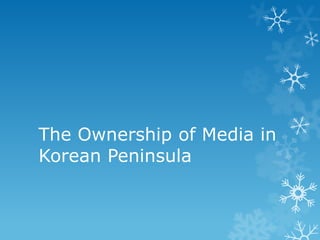
Korea media system
- 1. The Ownership of Media in Korean Peninsula
- 3. Why?
- 4. First, North and South Korea share a common culture, language, customs, and history, but later separated because of political reasons and ideology. Second, differences in the political system influence the media system, especially the issues of ownership. On the one hand, North Korea keeps a closed-door policy, so that the media is controlled by the state, while on the other hand, South Korea is embracing an open democratic system, opening the door for foreign investors.
- 5. Third, differences in the political system make South Korea more progressive than North Korea. It is influenced by the investment climate, and also a checks and balances system. This fact could be the reason why South Korean pop culture has spread to the rest of the world and become a global commodity.
- 7. Text There is not much information about the media landscape in North Korea. North Korea media is the most strictly controlled in the world. North Korea's constitution guarantees freedom of the press and expression, but it is limited only to matters that flatter the state and its leader. According to Yoon (2001) almost all news TV channels and radio news are propaganda. Its contents are mostly news the leader Kim Jong-un as well as news about the badness of other countries, especially South Korea and the United States (U.S). Even some cartoon series for children also display negative propaganda about U.S. http://www.youtube.com/watch?v=ojtBPoll9Q4 http://www.youtube.com/watch?v=pSWN6Qj98Iw
- 8. Text (2) Media in South Korea is dominated by entertainment aspects, including film, K-Pop music, dance, drama series, and also sitcoms. Media production is not only designed to meet the needs of Korean people in entertainment aspects, but also to be exported to some countries that make Korea to be a trendsetter. Since early 2000, the Korean entertainment industry became a trendsetter in the world, especially in Southeast Asia. In fact, Korea is also expanding its entertainment industry to the U.S. http://www.youtube.com/watch?v=dXsxJ-V6WpA http://www.youtube.com/watch?v=EhDj9EQTrIs http://www.youtube.com/watch?v=6DFEfvG47Rc
- 9. Context: Historical Background Both of them were colonized by Japan, and then split apart due to political factors and ideology option. The surrender of Japan in August 1945 led to the immediate division of Korea into two occupation zones, with the U.S. administering the southern half of the peninsula and the Soviet Union taking over the area to the north of the 38th parallel.
- 10. Context (2): The Ownership In North Korea, the media is managed and controlled by the state. KCNA is the only institution that supplies all the information required by the media. The media is strictly controlled by government. As of mid-1993, there were eleven television stations, approximately two dozen AM stations, ten FM stations, eight domestic shortwave stations, and a powerful international shortwave station
- 11. In South Korea, a private broadcasting company was established in 1990 and a number of private local companies were also licensed. Along with political liberalization, new media have rapidly developed. The government has played a leading role in employing cable television, internet, DBS and digital television. These new media need enormous financial resources that only the private sector can afford. After a five-year-long debate in the National Assembly, a new Broadcasting Act was passed in 2000. Privatization and opening up the market are the main premises of the new law.
- 12. The Ownership in S Korea Network KBS Government 100 % MBC MBC Fund 70%, SBS Chongsoo Fund 30% Local Stations City in each Private companies 30 % province Special Stations Education, Government 100% Transportation City Religion Religious fund
- 13. Capital controls the media The age of keen competition Concentrated Ownership Commercialisation and Sensationalitation
- 14. Conclusion: Socio-Cultural Practice The differences in media system are influenced by socio- political differences in each country's ideology. The North Korean system chose a communist as ideology, so the media policy is also based on this system that placed state as a central role. Through the communist system, foreign capital was rejected. On the other hand, South Korea chose the policy of capitalism, particularly since the 1990s.
- 15. Conclusion: The Differences North Korea South Korea State ownership High Low Development of mass Low High press High Getting lower Political parallelism Low High Professionalization High Low State interventions
- 16. References Fairclough, N. (2003). Analysing discourse: Textual analysis for social research. London: Routledge. Hallin, D. C., & Mancini, P. (2004). Comparing media systems: Three models of Media and Politics. Cambridge, UK: Cambridge University Press. Yoon, S. (2001). Democratization and the mass media: comparative perspectives from Europe and Asia. A paper that presented in Bellagio, Italy, 9-13 April 2001.
- 17. 감사
